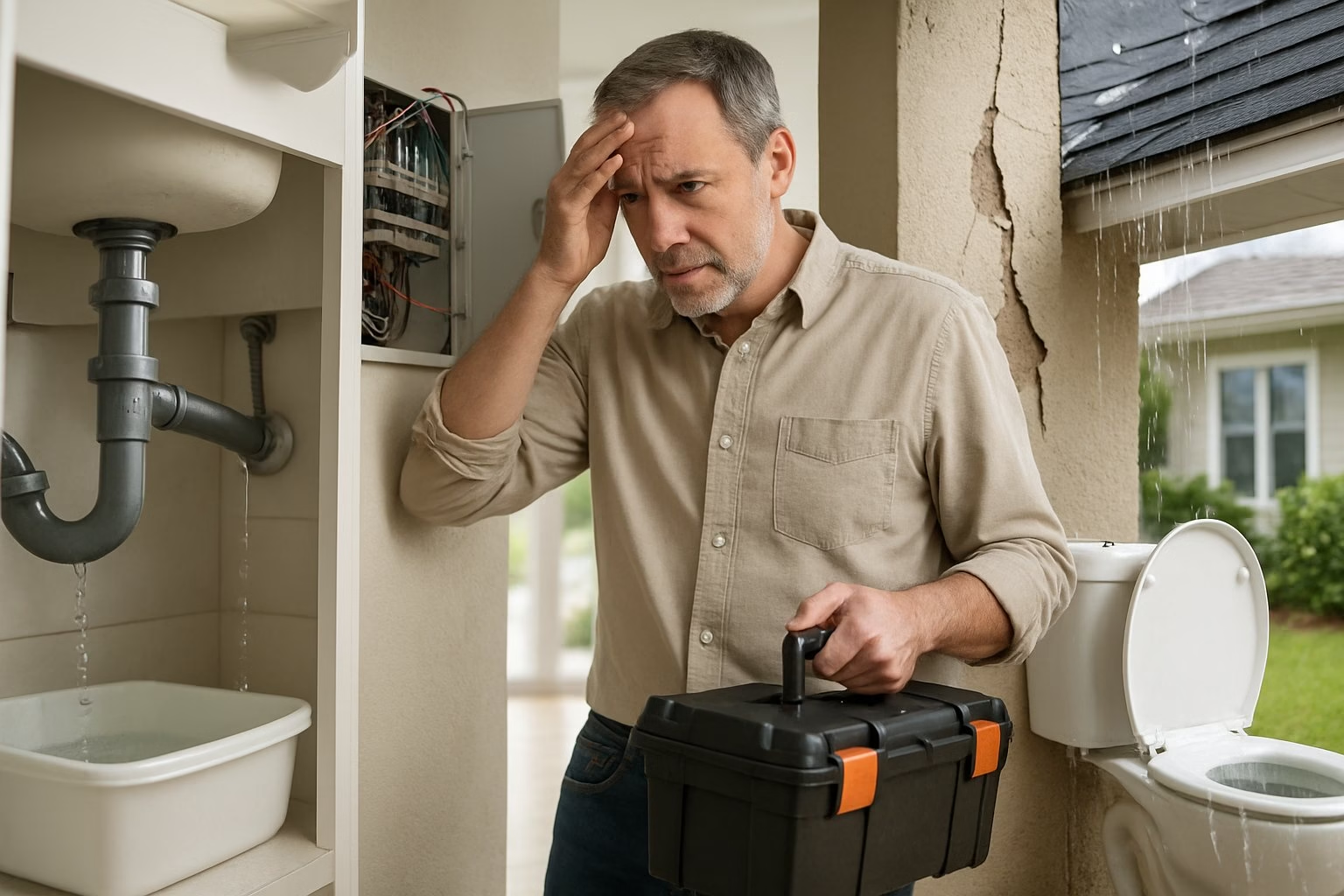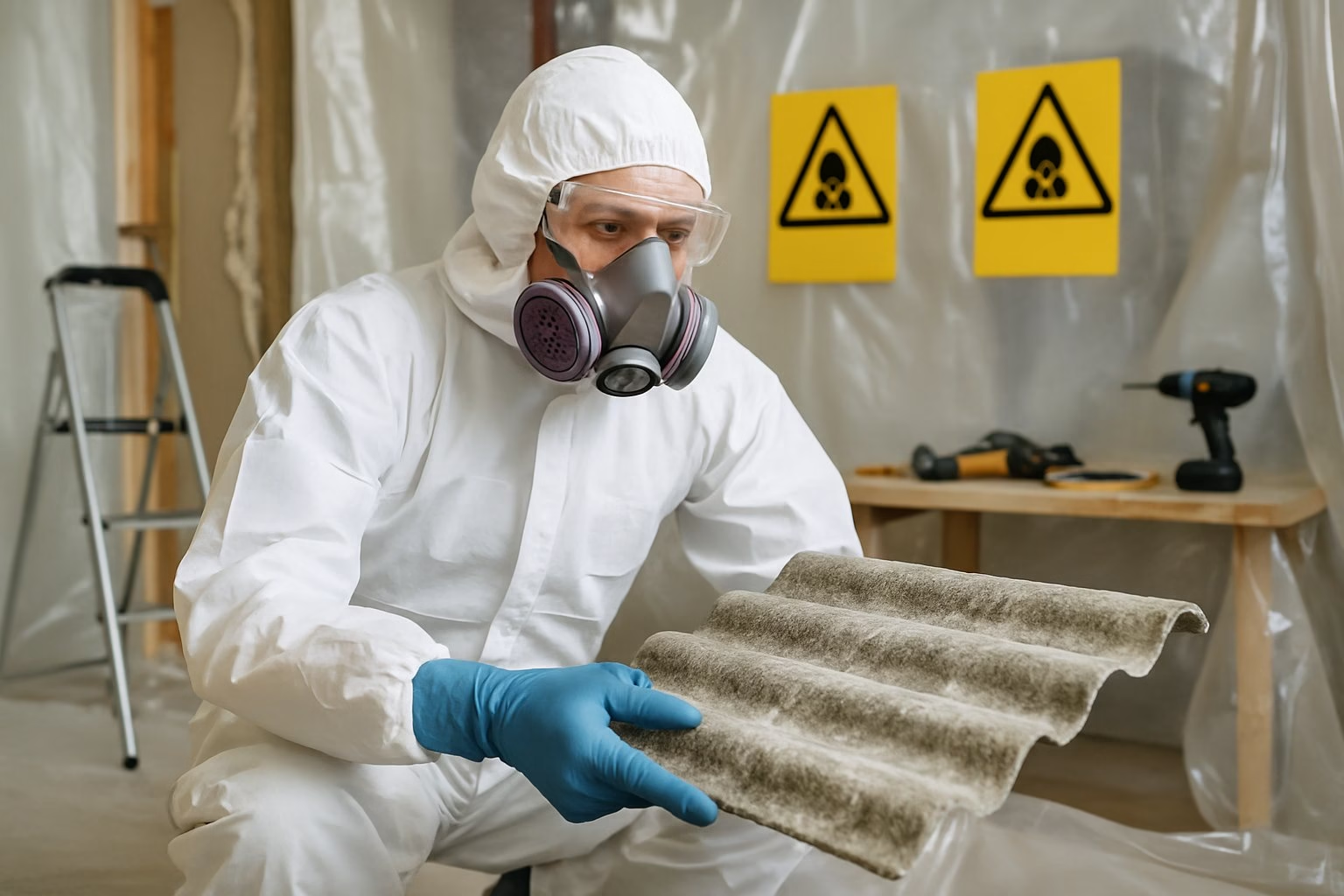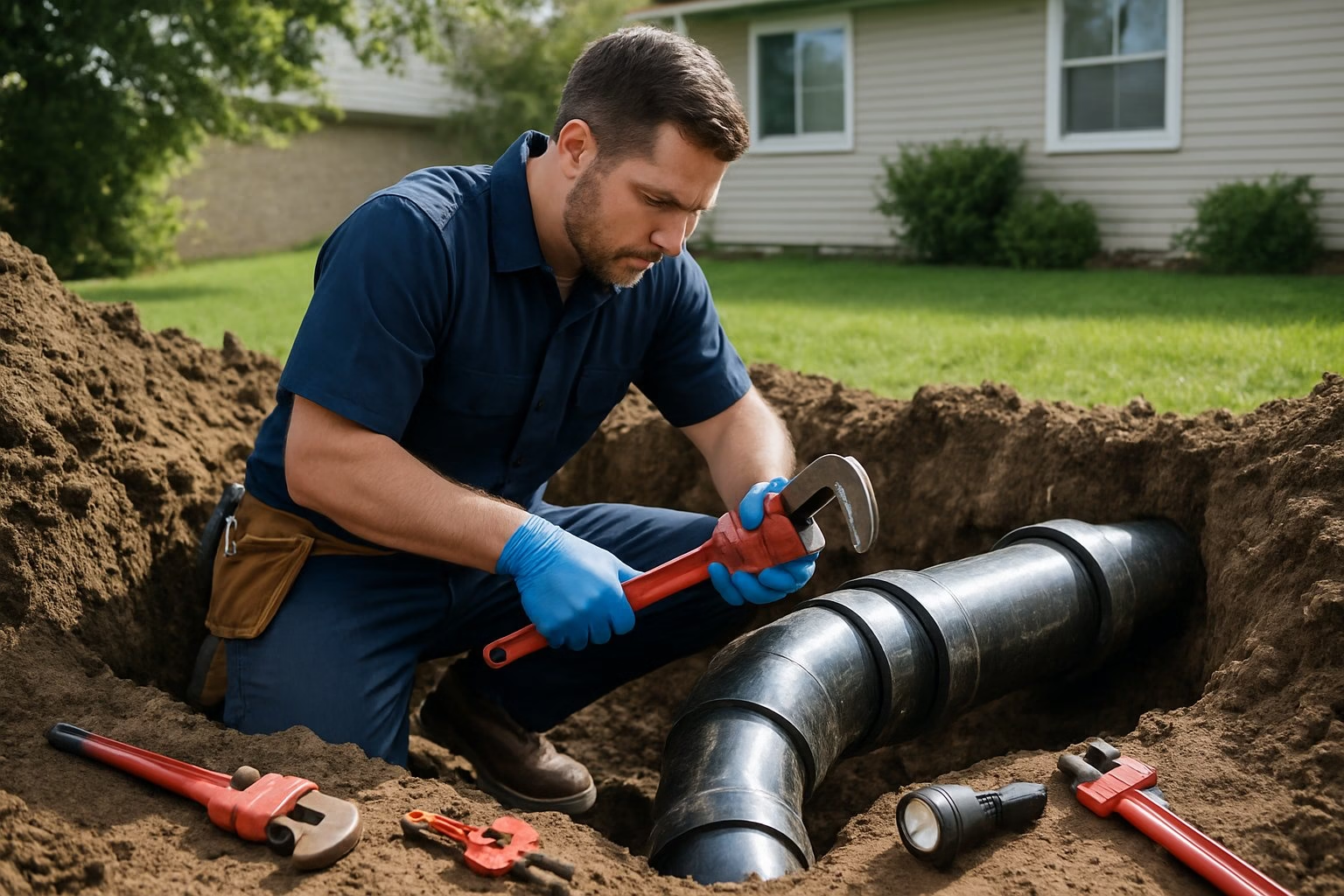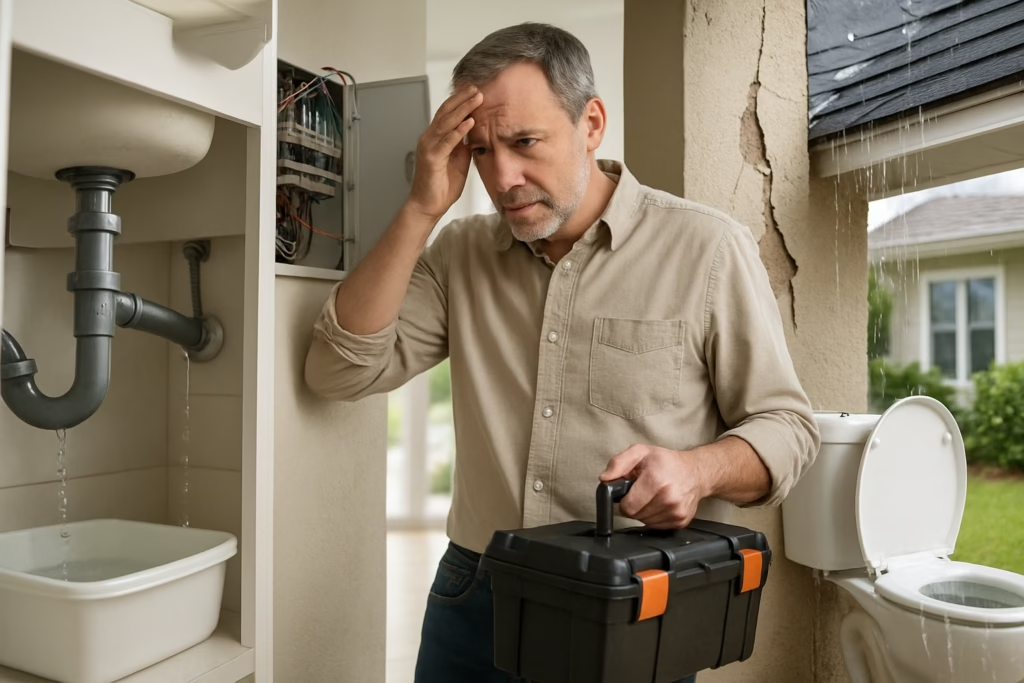Plenty of homeowners get the itch to fix things themselves, hoping to save some cash or just feel handy. With YouTube tutorials and home improvement shows everywhere, it almost feels like you could tackle anything if you just try hard enough.

But let’s be real: some repairs are just too risky or complicated for most people to handle safely. If you try certain projects without the right training or tools, you could end up hurt—or in way over your head with expensive damage.
Knowing when to call a pro can keep your family and your wallet safe from disaster.
1) Electrical repairs involving wiring or panels due to high risk of shock and fire
Messing with electrical wiring and panels is downright dangerous. Even a small error can shock you badly or spark a fire.
Your electrical panel runs power through your whole house. If you slip up, you might overload a circuit or cause a hidden hazard.
Old wiring makes things even riskier. Outdated systems just can’t keep up with modern life, which means they overheat and could catch fire.
When you do electrical work yourself, you might break local building codes. Insurance companies often won’t cover damage from unpermitted work.
Electricians have the training and gear to stay safe. They know how to shut off power and test everything before starting.
Even changing an outlet can go sideways. Wires might be damaged or not wired right behind the wall, and it’s easy to nick insulation without realizing.
Pros catch problems you won’t see. They make sure everything’s up to code and safe for the long haul.
2) Gas appliance repairs including installing or moving gas lines to prevent leaks and explosions
Gas lines are no joke. If you try to fix, install, or move gas appliances yourself, you’re putting everyone at risk.
Gas leaks can turn deadly fast. One tiny mistake could mean an explosion or fire.
Plumbers who work with gas know what they’re doing. They have the right tools and follow strict safety codes.
DIY gas jobs often mess up pipes or fittings, which leads to costly repairs. It’s usually pricier to fix your mistakes than to hire a pro in the first place.
Most places require permits and inspections for gas work. Only licensed pros can actually get those permits.
Some gas leaks are invisible and odorless. Professionals use special tools to find leaks you’d never notice.
Hit a gas line by accident and you could put your whole block in danger. It’s just not worth it.
Licensed gas techs carry insurance for their work. If you mess up, your insurance might not pay for the damage.
Installing gas appliances demands exact measurements and connections. A small slip could mean carbon monoxide in your home or a gas buildup you can’t smell.
Bottom line: always call a licensed pro for anything involving gas. No exceptions.
3) Roof repairs because of fall hazards and structural complexity
Climbing up on your roof is just asking for trouble. Falls are the number one roofing accident and can be life-changing or worse.
Chances are, you don’t own the safety gear roofers use. Steep angles and slippery shingles make it way too easy to lose your footing.
Roof repairs seem simple from the ground, but once you’re up there, it’s a whole different story. What looks like a shingle issue might actually be a bigger structural problem.
If you guess wrong about the real issue, you’ll waste money and time. Bad repairs can let water in and weaken your roof even more.
Roofers have the know-how and tools that most of us don’t. They understand how everything fits together and spot things you’d probably miss.
DIY roof work can void your warranty. Insurance companies might also refuse to pay if you damage your roof trying to fix it yourself.
4) Asbestos removal which requires specialized safety equipment and procedures

Asbestos removal is seriously hazardous. If your place was built before 1980, there’s a good chance it has some hidden somewhere.
You need real training to even spot asbestos. If you break or cut it, you send toxic fibers into the air—stuff that can cause cancer and other nasty diseases.
Pros wear full protective gear and breathing masks. They also use tools regular folks can’t get.
They seal off the work area to stop contamination. Air testing before and after is a must, and that equipment isn’t cheap.
Licensed contractors have to follow strict rules from OSHA and environmental agencies. They need permits and even have to let authorities know before starting.
Botched removal can spread asbestos throughout your home. That makes cleanup harder, pricier, and way more dangerous for your family.
Abatement pros know how to get rid of asbestos without putting you or anyone else at risk.
5) Major plumbing repairs such as fixing sewer lines or major leaks

Big plumbing jobs need tools and skills most of us just don’t have. If you mess up, you can cause some real damage.
Sewer line repairs, for example, mean digging deep. One wrong move could flood your basement or crack your foundation.
Major leaks can ruin your home fast. If you don’t fix it right, you might get mold or water damage that costs a fortune down the road.
These jobs usually involve the main water supply. If you shut off the wrong valve, your whole house might go dry, and then you’ll need a pro anyway.
Plumbers bring cameras to look inside pipes and have heavy-duty tools to clear out blockages.
Major plumbing jobs usually need city permits. Licensed plumbers know what paperwork to file and how to keep everything up to code.
Water and electricity are a dangerous combo. A pro knows how to work around outlets and wires safely.
Fixing your own mistakes usually costs more than just hiring a plumber in the first place.
6) Wall demolition involving structural changes that could compromise building integrity
Knocking down a wall might sound simple, but it gets risky in a hurry. Some walls hold up your whole house—these are load-bearing and not always obvious.
You can’t just eyeball which ones are load-bearing. Take out the wrong wall and you could end up with sagging ceilings or slanted floors.
That kind of damage doesn’t show up right away. Over time, you might face huge repair bills for structural fixes.
Load-bearing walls support everything above them. If you remove one without adding support, the weight has nowhere to go.
Building codes control this stuff for a reason. You’ll need permits for most structural changes, and cities will want to inspect the work.
Contractors know how to spot load-bearing walls and install proper supports first. That’s how they keep your house standing.
Demolition tools are dangerous, too. Sledgehammers and saws can hurt you if you’re not careful, and there might be hidden wires or pipes in the wall.
Let the pros handle wall removal. They’ve got the training and equipment to do it right.
Risks of Attempting Complex Home Repairs
Tackling big repairs without the right know-how can put you in real danger—physically, legally, and financially. Sometimes, the risks just aren’t worth the small amount you might save.
Personal Safety Hazards
Electrical work is probably the most dangerous for DIYers. You could get shocked, burned, or even start a fire by messing with wiring or panels. Some jobs look easy but can turn deadly fast if you don’t know what you’re doing.
Falls send millions to the ER every year. Climbing roofs or ladders, or even just reaching high spots, can end badly. A misplaced ladder or a slippery shingle can mean broken bones—or worse.
Chemical exposure is another hidden danger. Removing popcorn ceilings or refinishing old surfaces can stir up asbestos or lead paint. Breathing that stuff is just asking for trouble.
Gas line work can cause explosions or carbon monoxide leaks. Gas builds up quickly and can ignite from the tiniest spark. Bad connections let dangerous gases collect in your house.
Potential Legal and Insurance Issues
Your homeowner’s insurance might not pay for damage from DIY work gone wrong. If you do something unlicensed and it causes a problem, you could get stuck with the bill.
Permits are required for most big jobs. Skip them, and you could get fined by the city. You might also have trouble selling your house if inspectors find unauthorized work.
Liability is a real concern if your work hurts someone else. If your wiring starts a fire that spreads next door, you could get sued. Contractors carry insurance for a reason.
Hidden Costs and Complications
Small mistakes can snowball into bigger, pricier problems. A botched plumbing fix can turn into a full-blown water damage nightmare.
Tools and materials for major repairs add up fast. Sometimes you’ll spend more on gear than you would hiring a pro.
Projects drag on when you don’t have experience. What should take a couple days can stretch into weeks, and you might end up paying for temporary fixes or even a place to stay.
Benefits of Hiring Licensed Professionals
When you hire a licensed pro, you get someone with real skills, proper tools, and insurance. The work meets building codes and usually comes with a warranty—peace of mind you just can’t get with DIY.
Guaranteed Workmanship
Most licensed contractors offer warranties on their work—sometimes for a year or two. If something goes wrong, you’re covered.
If the work doesn’t meet standards, you can file a complaint with the licensing board. That’s real legal protection, not just a handshake deal.
Insurance coverage means you aren’t on the hook if a worker gets hurt at your place. Licensed pros carry liability and workers’ comp insurance.
Quality work from licensed pros follows all the local codes and permit rules. That way, your repairs pass inspection and keep your home’s value intact.
Access to Specialized Tools and Expertise
Licensed pros have all sorts of expensive tools that most folks don’t own. Think voltage testers, wire strippers, circuit analyzers—stuff you probably don’t have tucked away in the garage.
They’ve also got years of training under their belts. That experience lets them spot hidden problems, like ancient wiring or even structural damage, before things spiral into bigger headaches.
Trade licenses aren’t a one-and-done deal. Contractors keep up with new materials and techniques, so they’re always in the loop about building codes and safety standards that seem to change every year.
Contractors also have connections. They can snag specialty parts and materials at wholesale prices, which usually beats what you’d pay at the hardware store.
Long-Term Cost Savings
When a professional does the job right the first time, the work just lasts longer. DIY electrical mistakes? Those can lead to fires or toasted appliances—definitely not worth the risk.
Most of the time, permit fees are baked right into a pro’s estimate. You don’t have to stress about paperwork or figuring out which projects need the green light from the city.
Insurance companies get picky about unpermitted DIY work. If something goes wrong, they might deny your claim, but pro repairs with proper permits keep your coverage safe.
Buyers and inspectors trust repairs done by licensed professionals. Documented work means your home’s resale value doesn’t take a hit from questionable DIY fixes.
Pros work fast, too. What might take you two weekends, they can knock out in a few hours, so your routine isn’t totally upended.
Frequently Asked Questions
DIY home repairs can get risky—injuries, property damage, even code violations can sneak up on you if you don’t know what you’re doing. It’s smart to weigh the risks and know when to call in someone who does this for a living.
What are the risks of DIY electrical repair in a home?
Electrical work is dangerous. Shock, burns, or even electrocution can happen fast, and a small mistake might start a house fire.
DIY electrical repairs usually break local codes, which creates headaches when you try to sell or file an insurance claim.
If you wire something wrong, you can overload circuits and fry your appliances. Electricians train for this stuff—they know how to handle live wires and get everything installed safely.
Why should structural repairs be left to professional contractors?
Structural repairs keep your home standing. Get it wrong, and you could end up with a collapsed wall, floor, or ceiling.
Messing with load-bearing walls takes real engineering know-how. Remove the wrong support, and your whole house could be in trouble.
Most structural work needs a permit. Contractors already know the codes and can pull the right permits for you.
How can attempting plumbing repairs without expertise lead to complications?
Major plumbing mistakes can flood your place and rack up thousands in water damage. Plus, wet areas are a breeding ground for mold that messes with your air quality.
Sewer line repairs? They can expose you to nasty gases and bacteria if you don’t handle things right.
Bad pipe connections often leak inside walls, where water damage and pests can quietly build up over time.
What are the dangers of repairing a roof without proper training and equipment?
Falls from roofs can be deadly, even from a single story. Roofers use safety gear and know how to handle those steep angles.
Step on damaged roofing, and you might fall right through. Add rain or ice, and it’s even riskier.
Shoddy repairs can make leaks worse or void your roof’s warranty. You might even damage gutters, siding, or your landscaping below without meaning to.
Why is it essential to hire a licensed professional for HVAC system repairs?
HVAC systems use refrigerants that need special handling. If released, these chemicals hurt the environment and your health.
Gas-powered heaters can leak carbon monoxide if fixed wrong. Since you can’t see or smell it, that’s a real danger.
Modern systems have tricky electronics that need special diagnostic tools. Mess up a repair, and you could break expensive parts or kill your system’s efficiency.
What complexities are involved in foundation repair that necessitate a specialist?
Fixing foundation problems isn’t as simple as patching a crack or pouring some concrete. You’ve got to analyze the soil and crunch some engineering numbers to get it right.
If you use the wrong repair method, you might actually make the settling or cracking worse down the line. That’s a risk nobody wants to take.
Excavating around a foundation means bringing in some heavy-duty equipment. Honestly, you need proper training just to run that machinery safely, especially when you’re working so close to your house.
There’s also the whole waterproofing and drainage situation. If you don’t install these systems correctly, water just keeps sneaking in and messing with your home’s structure.

